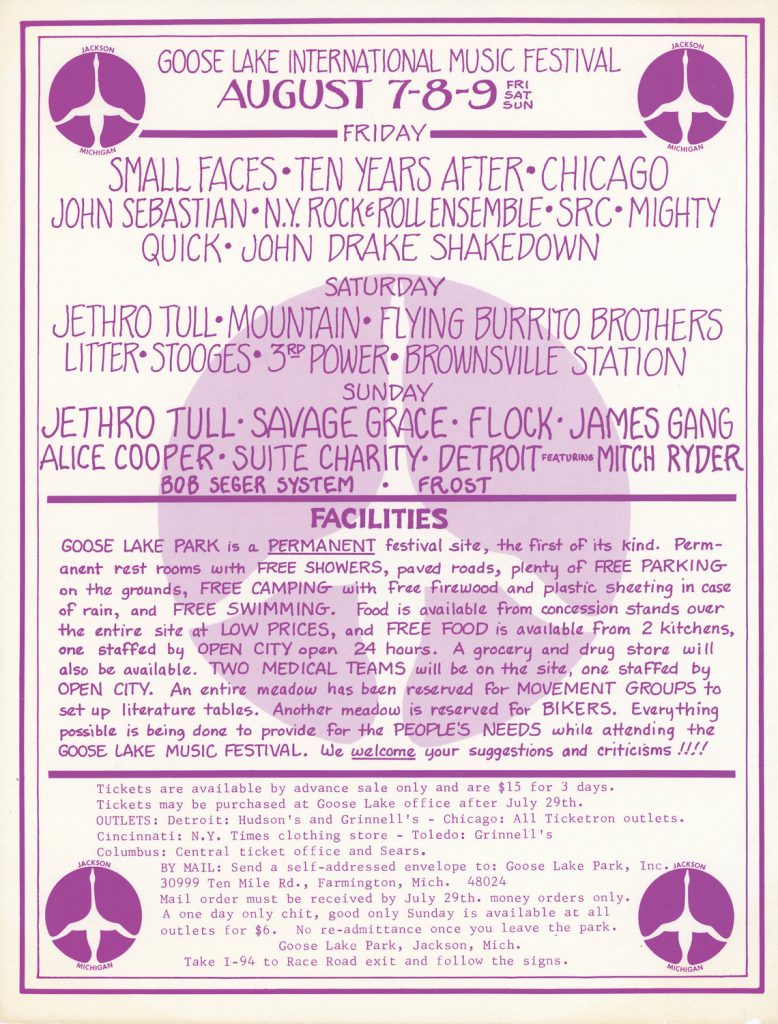Set on a revolving stage, and pumped through a colossal sound system, The Goose Lake International Music Festival showcased a now-iconic roster of both international and local rock legends. Each time the stage spun 180-degrees, another band would promptly start rockin’ in front of the 200,000 spectators. Here’s a quick breakdown of the talent.
The Stooges
For those who were not in attendance, Third Man Records will release “Live at Goose Lake: August 8th, 1970.” The newly discovered soundboard recording captures Iggy Pop and The Stooges in all of their proto-punk glory. For decades, this performance was notable because it was the final show featuring original Stooges bassist Dave Alexander. Legend always had it that Alexander was too spaced out to play one decent note, but this stellar, high-energy recording proves that legend is false.
Faces
Whether they realized it at the time or not, The Goose Lake attendees who witnessed the set by the Faces were witnessing history. The super group had just reformed from the ashes of the Small Faces and featured a young Rod Stewart on lead vocals, future Rolling Stone Ron Wood on guitar and the late Ian McLagan on keyboards. The group were still on the road promoting its debut, “First Step,” and the following month would start recording its sophomore LP, “Long Player.”
National and international acts
All these years later, Goose Lake is still remembered not only because of the debauchery happening across the festival grounds, but also the impressive lineup of big-name acts. The stacked bill also comprised Jethro Tull, Chicago, Ten Years After, The Flying Burrito Brothers, Mountain, John Sebastian and The James Gang featuring Joe Walsh.
Bob Seger
Years before he grew out his beard and recorded classic rock ballads like “Night Moves,” “Still the Same” and “Mainstreet,” Bob Seger was already a local legend and touring road warrior. When he took the Goose Lake stage with his band, the Bob Seger System, he was fresh off the release of his latest album, “Mongrel,” and was firing on all cylinders. While later in his career he was known for penning radio-friendly ballads, this era of Seger’s career is littered with primal, unhinged rock ’n roll jams like “2+2 =?” and “Lucifer.” By 1970, Seger had already toured the country many times over, but playing in front of this massive festival crowd was no doubt a career milestone for the then-25-year-old troubadour.
Other Michigan mainstays: MC5 and more
Aside from Iggy and Seger, a laundry list of other Detroit-area bands rounded out the lineup, including scene legends, The MC5. After the group’s “Kick Out the Jams” live album propelled them into the spotlight in 1979, by the time Goose Lake was underway, they were already promoting their “Back in the USA” LP. The following year, the band dissolved after releasing its final studio album, 1971’s “High Time.” Other local comrades sharing the bill were Michiganders like Mitch Ryder, Brownsville Station, Savage Grace, Third Power, SRC, and Teegarden & Van Winkle.
The No-Shows
Due to contractual problems, a few bands were announced and promoted, but ultimately never hit the stage. The no-shows included local hero Alice Cooper and English rockers Savoy Brown and Joe Cocker. This is a perfect example of why promoters shouldn’t print the posters until the ink on the contract dries.


